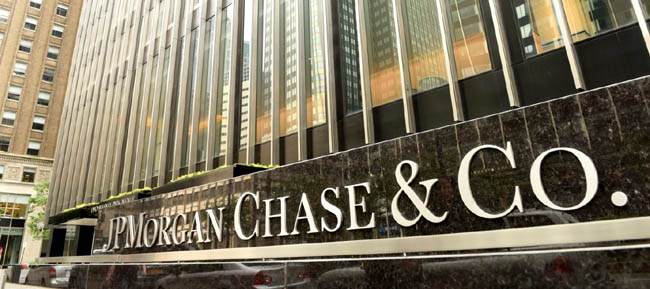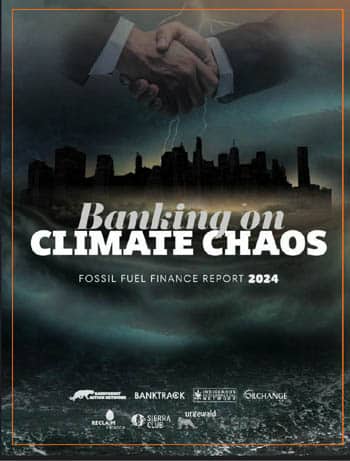
JP Morgan Chase is the #1 fossil fuel financier in the world
Since the Paris Agreement in 2016, the world’s 60 largest private banks financed fossil fuels with USD $6.9 trillion. Nearly half – $3.3 trillion – went towards fossil fuel expansion. In 2023, banks financed $705 billion in fossil fuel financing with $347 billion going to fossil fuel expansion alone. The 15th annual Banking on Climate Chaos report cuts through greenwash, covering the world’s top 60 banks’ lending and underwriting to over 4,200 fossil fuel companies.
 JP Morgan Chase is the #1 fossil fuel financier in the world, committing $40.8 billion dollars to fossil fuel companies in 2023. They’re also #1 for fossil fuel expansion in 2023, while Mizuho shot up to second place in the report in both fossil fuel financing ($37.0 billion) and financing for the expansion of fossil fuels ($18.8 billion). The worst funder of fossil fuel expansion since the Paris Agreement is Citibank, providing $204 billion since 2016.
JP Morgan Chase is the #1 fossil fuel financier in the world, committing $40.8 billion dollars to fossil fuel companies in 2023. They’re also #1 for fossil fuel expansion in 2023, while Mizuho shot up to second place in the report in both fossil fuel financing ($37.0 billion) and financing for the expansion of fossil fuels ($18.8 billion). The worst funder of fossil fuel expansion since the Paris Agreement is Citibank, providing $204 billion since 2016.
Recently, some banks increased their exposure to climate risk by rolling back their already weak policies. Bank of America, which ranks third on the 2023 list of worst fossil fuel funders, is a glaring example: they dropped their exclusions on Arctic drilling, thermal coal, and coal-fired power plants; they have neither energy ratio disclosures nor near-term absolute emission targets, and they abandoned the Equator principles. At the time of the report publication, they are the only bank major exhibiting all of these climate policy failures at once.
The report shows high bank financing for the most climate-damaging fossil fuel practices. In 2023, the worst funders of tar sands extraction are CIBC, RBC, Scotiabank, Toronto-Dominion Bank and Mizuho; while Mitsubishi UFJ Financial Group (MUFG) committed $512 million to companies doing ultra deep water offshore drilling; JP Morgan Chase financed fracking with $6 billion, and CITIC backed coal mining with $7.6 billion. The top 60 banks by asset size unabashedly financed the harmful practices to sensitive biomes: UniCredit committed $265 million to companies involved in Arctic drilling and Bank of America committed to companies extracting oil & gas in the Amazon biome to the tune of $162 million.
Banking on Climate Chaos is authored by Rainforest Action Network, BankTrack, the Center for Energy, Ecology, and Development, Indigenous Environmental Network, Oil Change International, Reclaim Finance, Sierra Club, and Urgewald. It has been endorsed by 589 organizations in 69 countries.
Key Findings
- The 60 biggest banks globally committed $705 billion USD to companies conducting business in fossil fuels in 2023, bringing the total since the Paris agreement to $6.9 trillion.
- These banks committed $347 billion in 2023 and $3.3 trillion total since 2016 to expansion companies – those companies that the Global Oil & Gas Exit List and the Global Coal Exit List report having expansion plans.
- In 2023, JPMorgan Chase ranks #1 as the worst financier of fossil fuels. The bank increased its financing from $38.7 billion in 2022 to $40.8 billion in 2023.
- Mizuho ranks #2 for financing overall. Mizuho increased its financing commitments for all fossil fuels between 2022 and 2023 from $35.4 billion to $37 billion. Mizuho rose 4 places in the overall annual ranks, from 6th in 2022.
- JPMorgan Chase ranks worst among banks committing financing in 2023 to companies with fossil fuel expansion plans according to the Global Oil & Gas Exit List and the Global Coal Exit List. Their financing commitments increased from $17.1 billion in 2022 to $19.3 in 2023. Mizuho ranks second for financing to companies with expansion plans ($18.8 billion).
- Mitsubishi UFJ Financial Group (MUFG) ($15.4 billion) ranks third worst among financiers of fossil expansion companies last year. Fourth place is shared by Royal Bank of Canada (RBC) ($14.9 billion), Scotiabank ($14.8 billion), Bank of America ($14.7 billion), and Citi ($14.6 billion), each of which committed more than $14.5 billion to expansion companies. Citi ranks as the worst financier of fossil fuel expansion companies for the period 2016-2023.
- Total financing committed for companies with methane gas (LNG) import and export capacity under development, increased from $116.0 billion in 2022 to $121.0 billion in 2023.
- Mizuho and MUFG, two of the three big Japanese banks, dominate the methane import/export (LNG) finance tables, providing $10.9 billion and $8.4 billion to companies expanding in the sector, respectively.
- Loans comprise 58% of the financing in this report in 2023, down from 65% in 2022. Total underwriting of bonds supporting fossil fuels increased from 2022 to 2023 by $24.3 billion, while loans decreased by $97.1 billion over the same period.
- Financing for acquisitions climbed to $63.3 billion in 2023, its highest since 2020, as the oil and gas industry undergoes a wave of consolidations and acquisitions.
- The big six US banks, JPMorgan Chase, Wells Fargo, Bank of America, Goldman Sachs, Citigroup, and Morgan Stanley, are the top 6 financiers of fracked gas activities. The next five companies are Canada and US-based: Royal Bank of Canada, CIBC, US Bancorp, Scotiabank, and Toronto- Dominion Bank.
- 15.4 % of the financing by dollar value issued in 2023 matures after 2030; 3.7 % matures after 2050. Financing for fossil fuel extraction or infrastructure that matures after 2030 faces a risk of becoming stranded. Financing that matures after 2050 raises serious questions about issuers’ and banks’ climate commitments.
- In terms of banks’ policies, only a few banks added new fossil fuel exclusion policies in 2023. A few new policies among European and Australian banks restrict project financing to new conventional oil and gas fields, which is a positive development. Unfortunately, several banks, including Bank of America and PNC, rolled back their previous exclusions in 2023.
- Banks continue to prioritize net zero targets, though early research suggests that these targets, like other bank policies, leave loopholes for ongoing fossil fuel finance.


